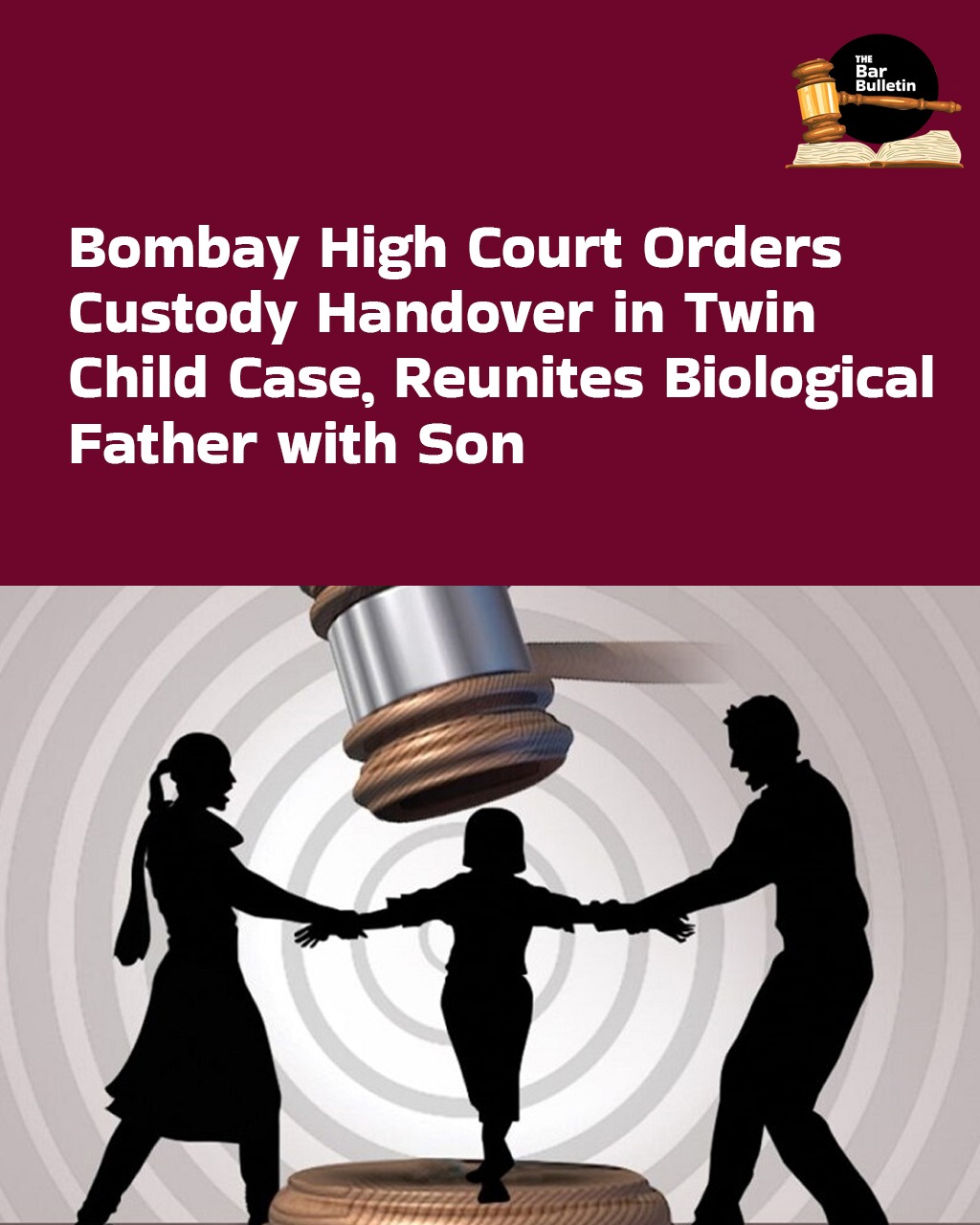The Bombay High Court partly allowed a habeas corpus petition filed by a biological father seeking custody of his 5-year-old twin son, directing police to secure custody from the child’s grandmother and hand him over to the petitioner within two weeks. The Division Bench comprising Justice Ravindra V. Ghuge and Justice Gautam A. Ankhad held that the biological father had an undisputed legal right to claim custody of his child, and that the grandmother had no superior right over the natural guardian despite emotional bonds.
The petitioner was the biological father of 5-year-old twins, with respondent No. 5 being the mother of the petitioner and respondents Nos. 6 to 8 being his sisters. One son was in the custody of the petitioner, whereas the other was admittedly in the custody of respondent No. 5. The petitioner was married on December 6, 2014, and twins were born to him on November 12, 2019, through surrogacy. At birth, the twins faced health complications, and it was agreed that one of them would remain under the care of respondent No. 5 (his mother). After the COVID-19 lockdown eased, several disputes arose between the petitioner and his parents, resulting in Case No. 106/D/2023 being filed by the petitioner before the Family Court under Section 25 of the Guardians and Wards Act, 1890 against his father (now deceased) for obtaining custody of his minor son, and FIR No. 841/2024 being registered by respondent No. 5 with the Malad Police Station under Sections 115(2), 126(2), and 352 of the Bharatiya Nyaya Sanhita, 2023, and Section 24 of the Maintenance and Welfare of Parents and Senior Citizens Act, 2007.
The petitioner submitted that he was fully capable of caring for the twins, the allegations against him were baseless, and the child should be reunited with his biological parent and twin brother, relying on Tejaswini Gaud v. Shekhar Tiwari (2019) 7 SCC 42 and Gautam Kumar Das v. NCT of Delhi (2024 INSC 610). However, the respondents’ opposed the submissions and argued that no emotional or parental bond had been shown by the petitioner’s wife, custody of one child had been voluntarily entrusted to respondent No. 5 and her husband (now deceased) at birth, and since then, the child had remained in their care, while the other suffered from cerebral palsy and the petitioner and his wife were financially and emotionally incapable of caring for both.
The Court, relying on the Supreme Court precedent in Tejaswini Gaud (supra), observed that the writ of habeas corpus was a prerogative process for securing the liberty of the subject and was also extended to restore the custody of a minor to his guardian when wrongfully deprived of it. The detention of a minor by a person not entitled to his legal custody was treated as equivalent to illegal detention for the purpose of granting a writ directing custody of the minor child. It was held that in exceptional circumstances, questions of custody could be examined within the limited scope of writ jurisdiction, and the present matter was found to fall within such extraordinary category.
The Court held that the petitioner being the biological father and natural guardian, had an undisputed legal right to claim custody of his child. The contention of respondent No. 5 that the petitioner was emotionally and financially incapable of caring for the twins could not be accepted, as custody could not be denied on the basis of these allegations. It was observed that while respondent No. 5 may share an emotional bond with the child, such attachment did not confer upon her a superior right to custody over that of the biological parent. The Court noted that there was no marital discord between the petitioner and his wife, the petitioner was employed with MCGM, and there was nothing on record to suggest that he was incapable of caring for his child, with the other twin who was suffering from cerebral palsy already being in his care.
Conclusively, the bench observed that the child could not be denied the care of his parents merely because of disputes between the Petitioner and Respondent No. 5, nor can property-related disputes deprive the biological parents of their lawful custody. The Court emphasized that the welfare of the child was the paramount consideration and that the biological father, being the natural guardian, had a clear legal right to custody, especially given there was no evidence of incapability or ill-intent on his part. To facilitate a smooth transition, Respondent No. 5 was permitted to meet the child on any weekday between 9:00 a.m. and 6:00 p.m. at the Petitioner’s residence or society for an initial period of three months, with Respondent Nos. 6 to 8 at liberty to accompany Respondent No. 5 during such interactions. It was further directed that no obstacle or issue was to be created by the Petitioner, either by himself or through his wife, during these meetings, and both parties were to extend full cooperation to safeguard the welfare and best interests of the child, with the liberty to approach the Family Court for appropriate directions in case of any difficulty.
Appearances:
Petitioner: Ms. M. J. Reena Rolland a/w Aishwarya BhandaryRespondent Nos. 1 to 4: Mr. Mayur Sonavane, APP
Respondent Nos. 5 to 8: Ms. Parul Shah i/b. Pratibha BangeraPolice: Mr. Mohd. Rafik Gavandi, P.S.I., Malad Police Station, Mumbai



